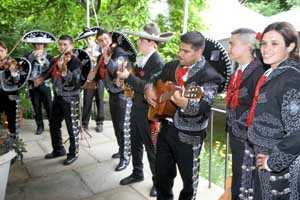Mexican Studies Center named for Katz during visit from President Fox
By William HarmsNews Office
 President of Mexico Vicente Fox (far left) and his wife, Marta Sahgún, join Friedrich Katz (center) and President Randel (right) to celebrate the naming of the University’s Mexican Studies Center. The center is named in honor of Katz, the Morton D. Hull Distinguished Service Professor Emeritus in History. During their visit to campus, the Foxes were treated to traditional Mexican music, which was performed by a student mariachi band headed by second-year Alejandro Flores.  The mariachi band, started by second-year student Alejandro Flores, entertain on the lawn of President Randel’s house during a visit to campus by the President of Mexico, Vicente Fox. | |
The University has named its Mexican studies program the Friedrich Katz Center for Mexican Studies, in honor of Katz, one of the world’s leading scholars of Mexican history.
The University announced the naming of the center Wednesday, June 16, during Mexican President Vicente Fox’s visit to campus. The University is committed to helping raise funds to cover the center’s operating expenses, President Randel said.
“The study of Mexico has been important at the University for nearly 80 years, and in the past 30 years our program has achieved international eminence,” Randel said.
“Those three decades match the tenure here of Friedrich Katz, perhaps the most distinguished historian of modern Mexico in the United States. His outstanding scholarship, his commitment to transnational collaboration and his devoted teaching have created a legacy that is acknowledged by students and colleagues around the world. Naming our Mexican Studies center for him reflects the esteem in which he is held by all of us and also our commitment to help provide continuing support for Mexican studies at Chicago.”
Katz, the Morton D. Hull Distinguished Service Professor Emeritus in History, directed the Mexican Studies Program from 1992 to 2002. The program, established in 1991, has become internationally recognized as an outstanding center for Mexican and U.S.-Mexican studies.
Scholars in the Mexican Studies Program examine the country’s government, its economic and environmental policy issues, as well its history, emigration and relationships with the United States.
Since the program’s founding, students at the University have completed nearly 70 doctoral dissertations and more than 100 masters theses on Mexican and U.S.-Mexico topics.
The program has organized more than two dozen major international conferences on such topics as financial stabilization and capital flow, agrarian issues and the Mexican Revolution, Mexico-U.S. migration, corruption and society, culture and development, and the history of the Mexican press.
In addition, the program has hosted well over 100 lectures and seminars on Mexican topics, and nine scholars from Mexican universities taught courses as Tinker Visiting Professors at the University. The Mexican Studies Program is part of the University’s broader Center for Latin American Studies.
“Throughout, the program’s central aims have been to foster the production of first-rate original research, to promote bi-national dialogues about history, policies and cultures, and to disseminate new knowledge within and beyond the walls of academia. Few other universities in the United States have forged as strong and useful an intellectual link with Mexico as has the University of Chicago,” said Emilio Kouri, Associate Professor in History and Director of the Friedrich Katz Center for Mexican Studies.
Katz has been a faculty member at the University since 1971. A specialist in 19th- and 20th-century history of Mexico, he also studies diplomatic relations between Latin America, Europe and the United States.
Katz has done path-breaking work on the Mexican revolution and in particular on one of the most important popular leaders of that revolution, Pancho Villa. His work includes the book The Secret War in Mexico: Europe, the United States and the Mexican Revolution (1982), which received the Conference on Latin American History’s Herbert Eugene Bolton Memorial Prize for the year’s best book in English on Latin American history.
In 2000, Katz received three more book awards for The Life and Times of Pancho Villa (1998): the Albert J. Beveridge Award, given annually by the American Historical Association for the best work in American history from 1492 to the present; a second Bolton prize; and the Bryce Wood Award for best book on Latin American studies from the Latin American Studies Association.
In 1997, Katz was named a corresponding member of the Mexican Academy of Sciences and also received the Orden del Aguila Azteca from the President of the Republic of Mexico in 1988.
He was made an honorary citizen of Chihuahua by the congress of the state in 1995, and has received honorary doctorates from the University of Colima, the University of Michoacán in Morelia, and the Free University of Berlin, and a golden doctorate from the University of Vienna. Katz also is a member in the American Academy of Arts and Sciences.
Born in Vienna, Katz and his family moved to Mexico when he was a child. He completed high school in Mexico, and in 1948 he received a B.A. from Wagner College in New York, followed by doctorate degrees from both the University of Vienna (1954) and a Doctorate Habil from Humboldt University, Berlin (1962).
![[Chronicle]](/images/sidebar_header_oct06.gif)